In the fast-paced e-commerce landscape, staying competitive means having the right tools in place to ensure smooth operations, streamline workflows, and deliver excellent customer experiences. One of the most powerful ways to achieve this is through e-commerce integration software, which serves as the backbone of modern online businesses.
E-commerce integration platforms bring together various systems, such as CRMs, ERPs, and marketing tools, allowing them to seamlessly communicate and share data. Whether you’re managing inventory, processing orders, or running marketing campaigns, integration tools ensure that all your systems are working in harmony.
In this article, we’ll explore the top e-commerce integration solutions that can elevate your business operations and enable scalable growth.
Table of Contents
- What is an E-commerce Integration Platform?
- Why E-commerce Integration is Essential for Online Businesses
- Website Platforms
- Customer Support Software Integrations
- Email Marketing Integrations
- Payment Gateways
- CRM Management Tools
- Shipping Integrations
- Benefits of Using Skyvia for E-commerce Integration
- Conclusion
What is an E-commerce Integration Platform?
An e-commerce integration platform is a centralized solution that connects the various tools and systems in your business ecosystem, helping them work together seamlessly. Whether it’s your online store, CRM, ERP, payment gateways, inventory management, or shipping systems, such a platform automates the data flow between all these applications. This ensures that critical information, such as orders, customer details, product availability, and inventory levels, is synchronized across your entire business in real time.
Think of it as the backbone of operations, ensuring everything from the front-end e-commerce store to back-end systems communicates smoothly. By handling all the data exchanges automatically, these platforms eliminate the need for manual input, reducing the chances of errors. Instead of juggling multiple disconnected systems, businesses can manage everything from a single, unified platform.
With everything connected and in sync, e-commerce businesses can streamline their workflows, improve productivity, and focus on what matters most: growth. Whether you’re a small business or an enterprise-level operation, integration platforms can help you save time, reduce errors, and operate at scale without the growing pains of manual data entry or disconnected systems.
Why E-commerce Integration is Essential for Online Businesses
In the competitive world of online marketplaces, e-commerce integration isn’t just a nice-to-have — it’s a must. The digital landscape constantly evolves, and businesses that fail to integrate their systems will quickly fall behind. Here’s why e-commerce integration is essential:
- Operational Efficiency: With everything automated, manual tasks, like order management, inventory updates, and customer communications, are handled more efficiently. This reduces human error, speeds up operations, and ensures that your systems are always up-to-date.
- Real-Time Data Synchronization: Whether it’s pricing, inventory levels, or order status, integrated systems ensure that every platform (website, CRM, ERP, etc.) reflects the latest information. Customers benefit from seeing real-time product availability, making their shopping experience smoother and more reliable.
- Enhanced Customer Experience: A seamless integration between front-end and back-end systems means a better overall customer journey. Customers get accurate product details, quick order processing, and up-to-date shipping information. This enhances trust, reduces friction, and increases the likelihood of repeat purchases.
- Scalability and Growth: You don’t need to worry about adding new software or dealing with complex integrations. Automated workflows and centralized management help businesses scale: easily expand into new sales channels, marketplaces, or geographic regions.
- Better Business Insights: Integrated data from multiple sources gives businesses a comprehensive, holistic view of their operations. From sales analytics to customer behaviors, having all your data in one place allows businesses to optimize marketing strategies, improve inventory management, and, again, provide better customer service.
- Competitive Advantage: Businesses that can adapt quickly to changes have a distinct advantage. E-commerce integration enables this agility, allowing companies to respond faster to market shifts, offer new services, and maintain high standards of customer satisfaction.
In short, e-commerce integration is a must for staying competitive, enhancing customer experiences, and boosting growth. In a fast-paced business world, it’s the key to reaching your full potential.
Now, let’s dive into some popular e-commerce tools and explore how they power different aspects of your business.
Website Platforms
E-commerce platforms, when integrated with website builders, serve as the cornerstone of any successful online store. These powerful tools streamline critical operations by automating tasks such as:
- inventory management,
- order processing,
- product listing updates.
Businesses can synchronize data in real time across their online storefronts, third-party marketplaces, and even physical retail locations, ensuring accuracy in stock levels, pricing, and order statuses.
This connectivity eliminates time-consuming manual processes, reduces the risk of errors like overselling, and enhances the overall customer experience. By simplifying these day-to-day operations, integrated website platforms free up valuable time and resources.
Shopify
Shopify is one of the most popular e-commerce platforms, known for its ease of use and extensive app ecosystem. It seamlessly integrates with a wide array of services, making it a go-to solution for businesses of all sizes. Shopify’s marketplace features thousands of apps, allowing users to connect everything from inventory management and shipping to marketing automation and analytics.
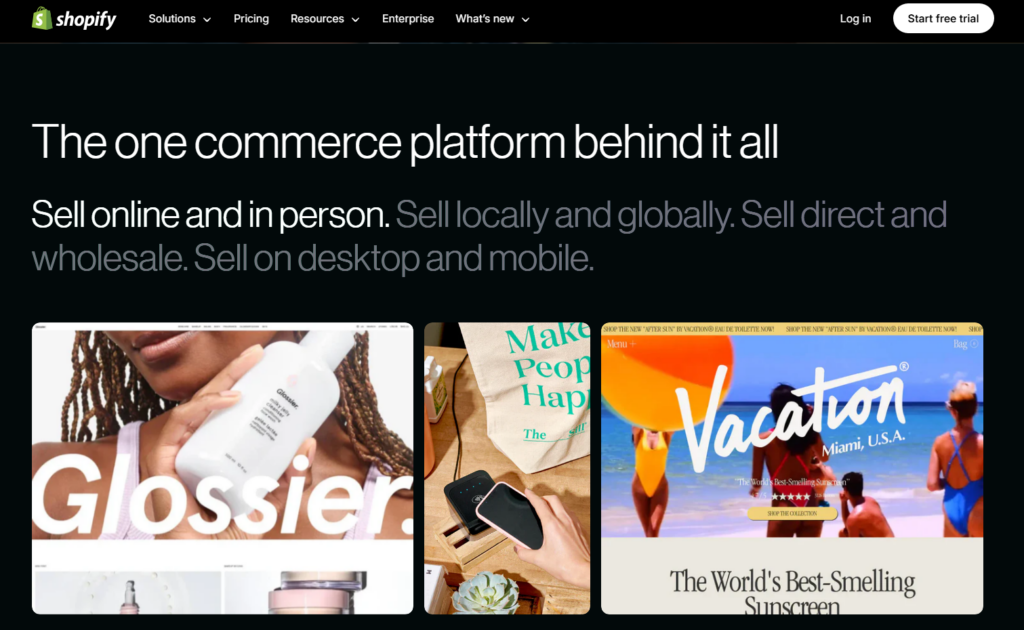
Whether you’re just getting started or scaling to an enterprise level, Shopify’s robust capabilities ensure you can easily customize and expand your store with minimal technical expertise.
Main Features
- User-friendly drag-and-drop website builder
- Integrated order and inventory management
- Multi-channel selling (online store, social media, marketplaces, POS)
- Vast app marketplace for additional functionalities (shipping, marketing, accounting, etc.)
- Secure payment processing with Shopify Payments
- Real-time analytics and reporting
Price
- Starter: $5/month
- Basic: $29/month (billed annually)
- Shopify: $79/month (billed annually)
- Advanced: $299/month (billed annually)
- Plus: Starts at $2,300/month
Transaction fees range from 2.9% + 30¢ to 2.4% per sale, with lower rates for using Shopify Payments.
Best for
Shopify’s seamless integrations and low entry price point make it ideal for those looking for an all-in-one solution that’s easy to set up and scale.
WooCommerce
WooCommerce is a powerful, open-source e-commerce plugin designed to integrate seamlessly with WordPress. This platform allows businesses to transform any WordPress site into a fully functional online store. WooCommerce stands out for its flexibility, offering a wide variety of extensions that cater to different business needs.
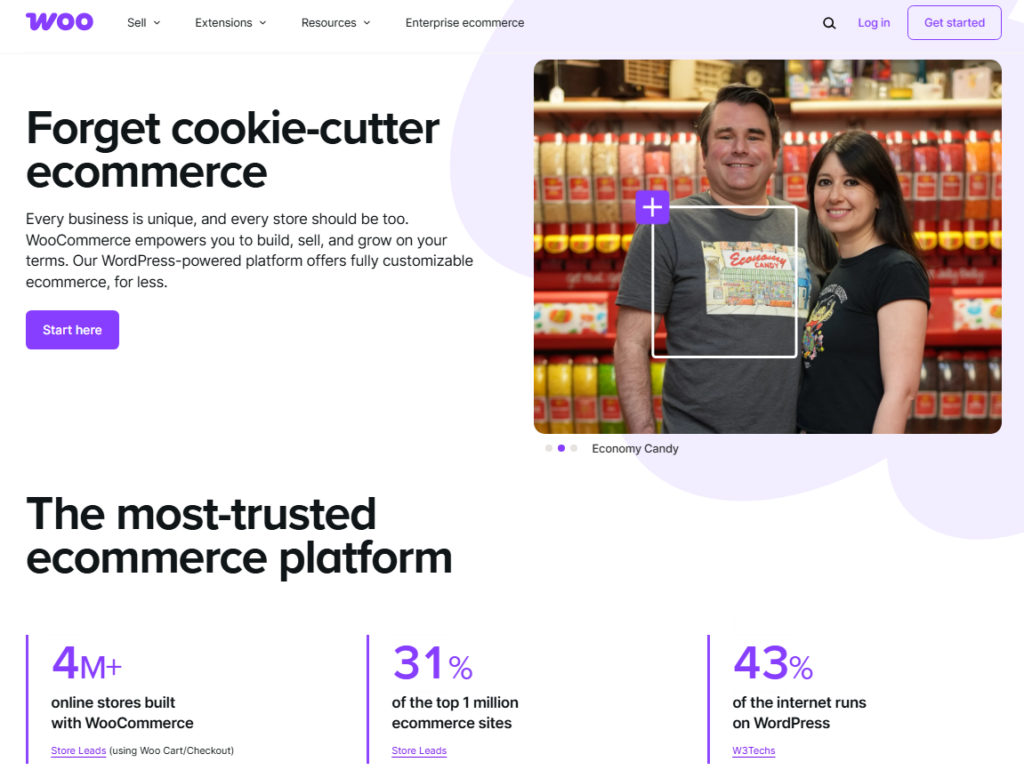
Whether you’re looking for a basic online store or a more complex setup, WooCommerce’s vast customization options enable you to build a store that fits your unique requirements. Being open-source, WooCommerce is perfect for developers who want complete control over their site’s functionality.
Main Features
- Deep integration with WordPress for streamlined content and e-commerce management
- Supports essential payment gateways and comprehensive order/customer management
- Flexible product listing and inventory management tools
- Extensive library of free and paid extensions (subscriptions, bookings, memberships, etc.)
- Open-source, highly customizable for developers
Price
- Core WooCommerce plugin: Free
Additional costs for premium extensions, advanced payment gateways, and specialized features, depending on store requirements
Best for
WooCommerce offers the ultimate flexibility, ideal for businesses that want to tailor every aspect of their store and are comfortable with WordPress’s open-source environment. While it’s free to start, additional costs for premium features can add up depending on the customization required.
Website Platforms Comparison
Both Shopify and WooCommerce provide efficient ways to manage inventory and orders. Shopify is the go-to for businesses seeking an out-of-the-box, managed solution, while WooCommerce is perfect for those wanting more control and flexibility, especially if they are already familiar with the WordPress ecosystem. The choice between the two depends largely on your business needs and level of technical expertise.
| Feature | Shopify | WooCommerce |
|---|---|---|
| Platform Type | Hosted, all-in-one e-commerce platform | Open-source plugin for WordPress |
| Ease of Use | User-friendly, drag-and-drop builder, minimal technical skills needed | Requires WordPress knowledge and more technical expertise for customization |
| Key Features | – Multi-channel selling (online, social, marketplaces, POS) – Vast app marketplace – Integrated order/inventory management – Secure Shopify Payments | – Deep WordPress integration – Flexible product/inventory tools – Extensive extensions library – Highly customizable |
| Customization | Extensive via apps, limited code-level control | Full control, highly customizable for developers |
| Pricing | – Starter: $5/mo – Basic: $29/mo – Advanced: $299/mo – Plus: $2,300+/mo – Transaction fees: 2.4%-2.9% + 30¢ | – Core plugin: Free – Additional costs for extensions, themes, and hosting |
| Best For | Businesses wanting an easy-to-use, scalable, all-in-one solution | Developers or businesses needing flexibility and WordPress integration |
Notes
- Shopify is ideal for quick setup and scalability with minimal technical effort.
- WooCommerce suits those comfortable with WordPress and seeking deep customization.
Customer Support Software Integrations
Delivering outstanding customer service is essential for building lasting loyalty and driving repeat business. Integrating customer support software with your e-commerce platform transforms how you manage customer interactions, significantly enhancing the overall experience. These integrations consolidate inquiries from multiple channels, such as email, live chat, social media, and phone, into a single, unified system, enabling support teams to respond with greater speed and precision.
With direct access to critical data like customer orders, purchase histories, and profiles, support managers can address issues faster and more accurately. This reduces resolution times, minimizes customer frustration, and creates a seamless, personalized experience. By automating repetitive tasks and centralizing communication, these tools free up your team to focus on building stronger relationships, fostering trust, and turning one-time buyers into loyal advocates for your brand.
Zendesk
Zendesk is one of the most robust and popular customer support platforms that integrates seamlessly with e-commerce platforms, allowing businesses to deliver consistent, high-quality support across multiple channels. It centralizes all customer inquiries — from email to chat, social media to phone — into a single dashboard, making it easier for customer support teams to track, manage, and respond to requests quickly. This integration not only improves response times but also boosts customer satisfaction by providing timely solutions to issues, directly tied to the customer’s orders and account details.
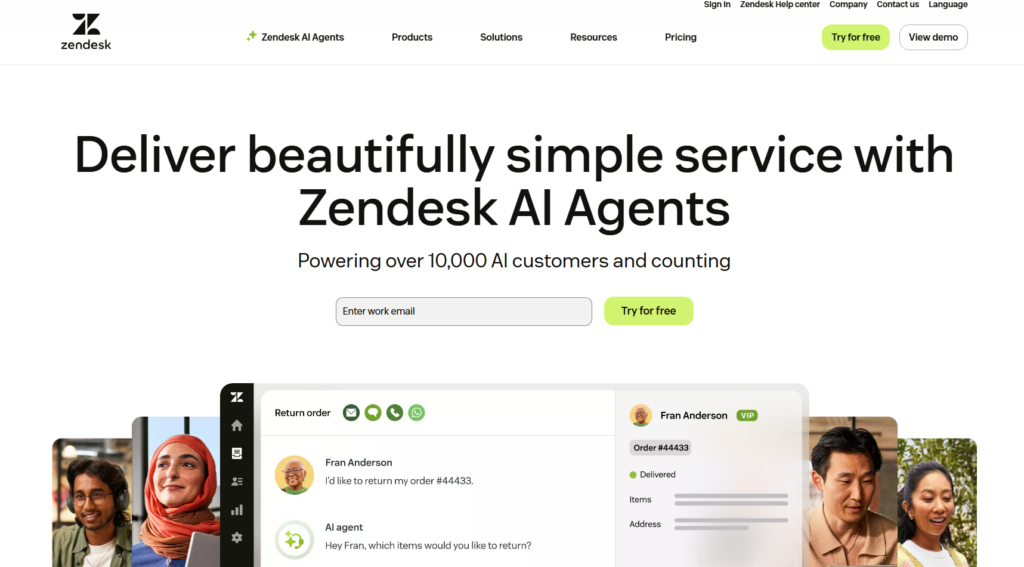
Main Features
- Omnichannel ticketing system (email, chat, social media, voice)
- Automated ticketing and workflow management to streamline operations
- Advanced reporting and analytics to track team performance and customer satisfaction
- Seamless integration with e-commerce platforms for real-time access to order and customer data
- Add-ons for enhanced capabilities, including AI-powered triage, workforce management, and quality assurance
Price
- Zendesk Support: Starts at $5/agent/month for basic plans
- Zendesk Suite: $49/agent/month for comprehensive omnichannel support
Add-ons:
- Workforce Management: $25/agent/month
- Advanced AI: $50/agent/month
- Quality Assurance: Starts at $25/agent/month
Best for
Zendesk is ideal for businesses of all sizes that need to scale their customer service operations and provide a unified experience across all channels.
Freshdesk
For small businesses or those just starting to scale, Freshdesk offers a powerful and cost-effective customer support solution with a strong suite of integration options. Freshdesk automates ticketing, provides multi-channel support, and enables businesses to set up workflows that help streamline support processes.
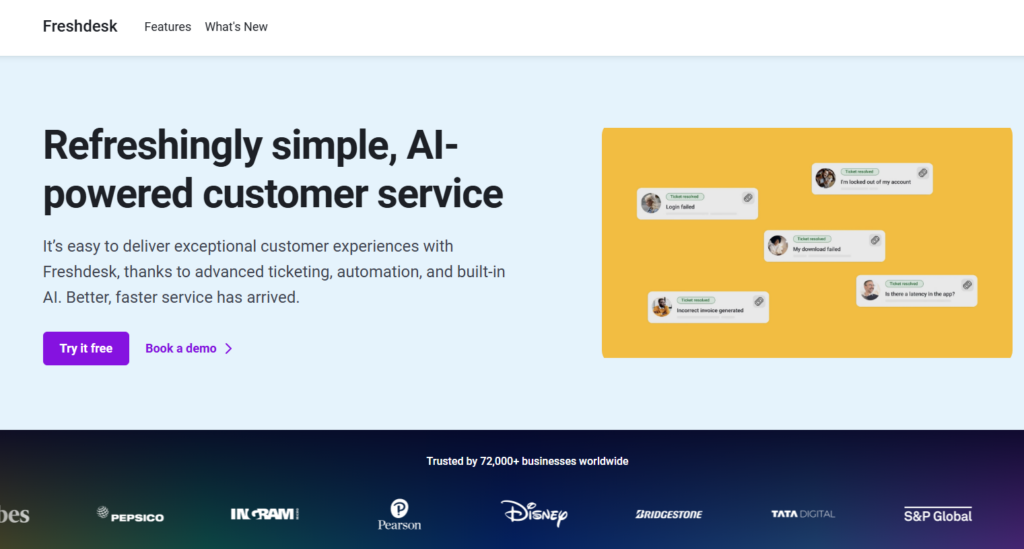
Additionally, with over 1,000 apps available through its marketplace, Freshdesk offers significant flexibility to extend functionality as needed. It’s an affordable option for businesses that want to automate their support systems and offer responsive, personalized service without a hefty price tag.
Main Features
- Integrated ticketing system supporting email, social media, and live chat
- Powerful automation and customizable workflows to reduce manual work
- Knowledge base to assist both customers and agents with self-service
- SLA management to ensure timely response and resolution
- Marketplace with over 1,000 integrations to extend functionality
Price
- Free plan: For up to 10 agents, basic support features
- Growth: $18/agent/month with added features for team collaboration and automation
- Pro: $59/agent/month with advanced reporting, SLA management, and custom automations
- Enterprise: $95/agent/month with enterprise-level customization and analytics
Best for
Freshdesk’s pricing structure makes it a great choice for growing businesses, with the flexibility to scale as your customer service needs increase.
Customer Support Software Comparison
Whether you’re looking for an omnichannel solution like Zendesk or a flexible, budget-friendly option like Freshdesk, both platforms offer robust features to help you meet your customer service goals. The right choice will depend on your business’s size, scale, and specific needs, so weigh the pros and cons and choose the tool that best aligns with your support strategy.
| Feature | Zendesk | Freshdesk |
|---|---|---|
| Platform Type | Robust omnichannel customer support platform | Flexible, cost-effective customer support solution |
| Ease of Use | Intuitive, centralized dashboard for all channels | User-friendly, ideal for small businesses with simpler setups |
| Key Features | – Omnichannel ticketing (email, chat, social, voice) – Automated workflows – Advanced analytics – E-commerce platform integrations | – Multi-channel ticketing (email, chat, social) – Automation & workflows – Knowledge base – 1,000+ marketplace integrations |
| Customization | Extensive add-ons (AI, workforce management, quality assurance) | Highly flexible via marketplace apps and custom workflows |
| Pricing | – Support: $5/agent/mo – Suite: $49/agent/mo – Add-ons: $25-$50/agent/mo | – Free: Up to 10 agents – Growth: $18/agent/mo – Pro: $59/agent/mo – Enterprise: $95/agent/mo |
| Best For | Businesses needing scalable, omnichannel support with advanced features | Small to growing businesses seeking affordable, flexible support solutions |
Notes
- Zendesk excels for businesses prioritizing omnichannel support and advanced analytics.
- Freshdesk is ideal for cost-conscious businesses with simpler needs and scalability.
Email Marketing Integrations
Email marketing remains a cornerstone for building meaningful connections with customers and driving consistent sales growth. Integrating email marketing platforms with your e-commerce system unlocks powerful opportunities to automate campaigns, deliver highly personalized content, and engage your audience with timely, relevant messages tailored to their needs.
By leveraging data such as shopping behaviors, purchase histories, abandoned carts, and browsing patterns, these integrations enable businesses to craft targeted emails that resonate deeply with customers, enhancing their experience at every touchpoint.
This seamless connection streamlines the entire customer journey, from nurturing leads to re-engaging past buyers, all while reducing the need for manual intervention. The result is increased engagement, higher conversion rates, and stronger, more loyal customer relationships.
Mailchimp
Mailchimp has long been a go-to platform for businesses looking to integrate email marketing seamlessly with their e-commerce operations. Known for its user-friendly interface and powerful automation features, Mailchimp allows businesses to design personalized campaigns based on customer data and interactions. It integrates smoothly with many popular e-commerce platforms, providing tailored messaging for everything from welcome emails to product recommendations and cart recovery. Whether you’re a small startup or a growing enterprise, Mailchimp offers the tools to optimize your email marketing and drive sales.
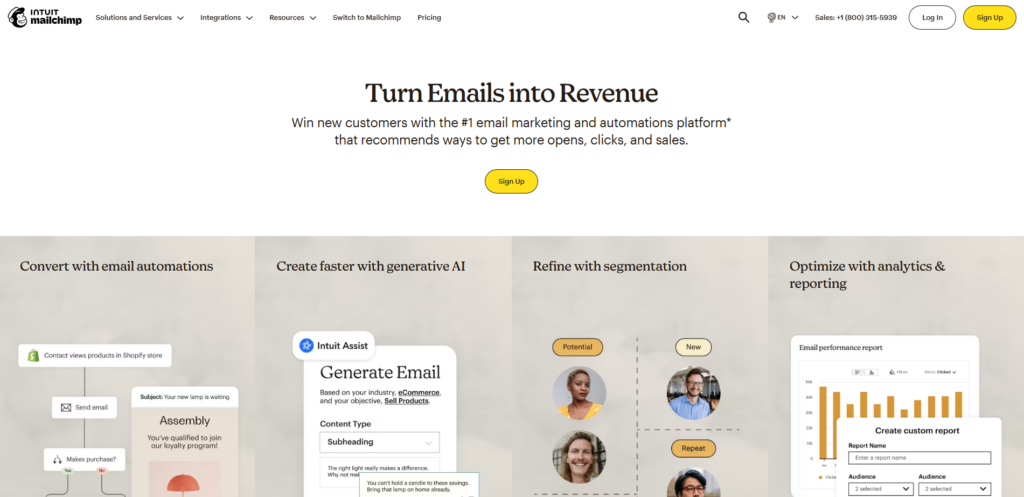
Main Features
- Drag-and-drop email builder for easy design
- Automated campaigns and customer journeys for streamlined communication
- Audience segmentation and personalization to target specific groups
- E-commerce integrations for abandoned cart reminders, product recommendations, and more
- In-depth analytics and reporting to track campaign performance
Price
- Free plan: Available for businesses with up to 500 subscribers
- Essentials: From $13/month, for basic email features
- Standard: From $20/month, includes advanced automation and reporting
- Premium: From $350/month, for large businesses with more advanced needs
Best for
Mailchimp’s flexibility and scalability make it a popular choice for businesses of all sizes, whether you’re just starting or looking to optimize your email marketing strategy.
Klaviyo
For businesses that need advanced email automation with deep ecommerce integrations, Klaviyo is the platform to consider. Klaviyo is a powerful tool known for its robust segmentation capabilities and real-time customer data analytics. It offers personalized messaging that’s based on real-time interactions, allowing businesses to send highly relevant emails and SMS messages to customers. With Klaviyo, you can create sophisticated automation flows, dynamic segments, and leverage predictive analytics to anticipate customer behavior and optimize campaigns.
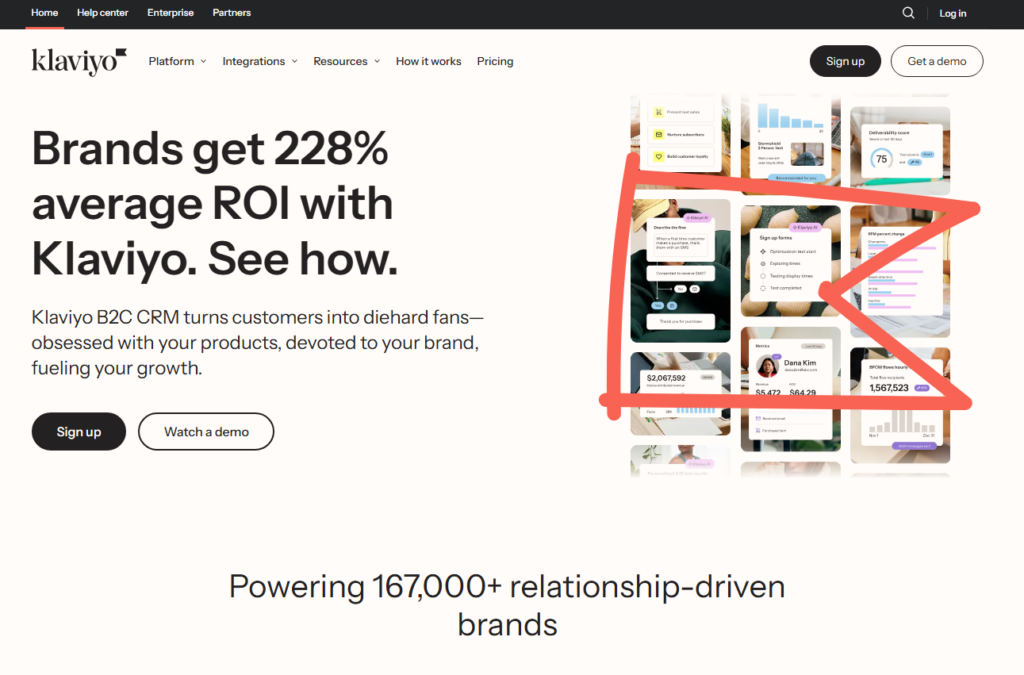
Main Features
- Advanced automation flows designed for e-commerce businesses
- Dynamic segmentation and predictive analytics to drive personalized messaging
- Integration with over 350 platforms, including major e-commerce platforms like Shopify, Magento, and BigCommerce
- Ability to run both email and SMS marketing campaigns from a single platform
- Comprehensive reporting and insights to optimize marketing performance
Price
- Free for up to 250 active profiles
- Email plan: Starts at $20/month for 251-500 profiles
- Email & SMS: Starts at $35/month for 251-500 profiles, includes SMS credits
Best for
Klaviyo’s rich feature set and advanced capabilities make it an excellent choice for businesses looking to take their email marketing to the next level, especially if they rely heavily on customer segmentation and data-driven insights.
Email Marketing Comparison
Both Mailchimp and Klaviyo offer powerful email marketing integrations for e-commerce businesses, but they serve different needs. While Mailchimp is ideal for companies looking for a user-friendly, scalable solution with solid automation features, Klaviyo offers deeper integrations and advanced segmentation capabilities for businesses that require more personalization and real-time data-driven insights.
| Feature | Mailchimp | Klaviyo |
|---|---|---|
| Platform Type | User-friendly email marketing platform | Advanced email and SMS marketing with a deep e-commerce focus |
| Ease of Use | Intuitive drag-and-drop builder, ideal for beginners | More complex, suited for data-driven marketers |
| Key Features | – Drag-and-drop email builder – Automated campaigns – Audience segmentation – E-commerce integrations (abandoned cart, recommendations) – Detailed analytics | – Advanced automation flows – Dynamic segmentation – Predictive analytics – Email & SMS campaigns – 350+ integrations |
| Customization | Flexible templates and segmentation, limited advanced analytics | Highly customizable with real-time data and predictive tools |
| Pricing | – Free: Up to 500 subscribers – Essentials: $13/mo – Standard: $20/mo – Premium: $350/mo | – Free: Up to 250 profiles – Email: $20/mo (251-500 profiles) – Email & SMS: $35/mo (251-500 profiles) |
| Best For | Businesses seeking an easy-to-use, scalable email marketing solution | Ecommerce businesses needing advanced segmentation and real-time insights |
Notes
- Mailchimp is great for beginners and businesses prioritizing simplicity and affordability.
- Klaviyo excels for data-driven ecommerce businesses requiring sophisticated automation and personalization.
Payment Gateways
A frictionless checkout experience is paramount for maximizing conversion rates, enhancing customer satisfaction, and fostering long-term loyalty. These integrations empower businesses to offer various payment options, accommodate multiple currencies, and adhere to rigorous security standards, ensuring a seamless and trustworthy customer experience worldwide.
By prioritizing ease of use and robust security, payment gateways not only build credibility but also strengthen customer relationships, laying the foundation for sustained business growth. Let’s dive into two of the most trusted and widely used payment gateway solutions, Stripe and PayPal, and explore how they drive e-commerce success.
Stripe
For businesses looking for a flexible, developer-friendly solution to integrate payments, Stripe stands out as a top choice. Its powerful API allows for custom e-commerce payment setups, giving businesses complete control over payment processing and checkout flows. Whether you’re offering subscriptions, one-time purchases, or handling complex payment scenarios across multiple currencies, Stripe has the tools to accommodate. Known for its seamless integration capabilities, Stripe ensures that transactions are secure, quick, and straightforward.
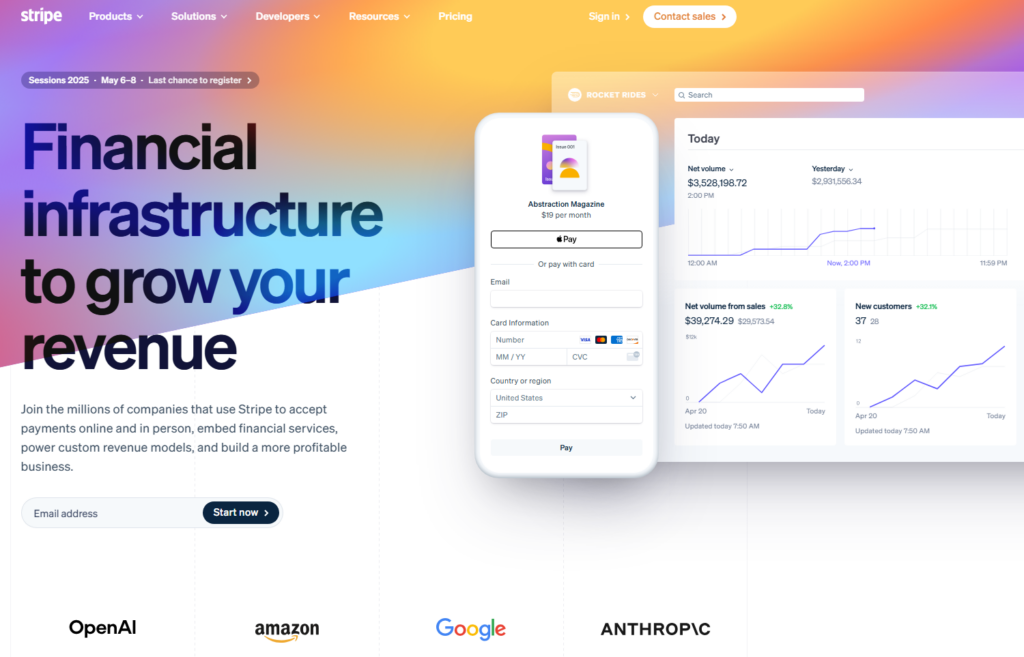
Main Features
- Developer-friendly API for custom integrations and flexible payment solutions
- Supports various payment methods, including credit/debit cards, wallets, and local payment options
- Built-in real-time fraud prevention tools to protect against malicious transactions
- Advanced reporting and analytics to track payment performance and business insights
- Secure and PCI-compliant infrastructure for enhanced security
Price
- No setup or monthly fees
- Standard processing fee: 2.9% + 30¢ per successful card transaction (US rates; fees may vary by region and payment method)
Best for
Stripe’s versatility and robust security make it an excellent choice for growing e-commerce businesses or those needing highly customized payment processing. Whether you’re just starting out or expanding internationally, Stripe provides the tools and scalability required for success.
PayPal
PayPal has long been one of the most trusted names in the global payments space, offering seamless integration with most e-commerce platforms. It’s a go-to solution for businesses that want to provide a familiar and secure payment option for customers worldwide. PayPal’s broad reach — available in over 200 markets — combined with buyer and seller protection programs, makes it a popular choice for merchants who want to provide peace of mind to their customers while keeping their payment processing simple.

Main Features
- Easy integration with major e-commerce platforms like Shopify, WooCommerce, and Magento
- Accepts payments from PayPal accounts, credit/debit cards, and local payment methods
- Robust buyer and seller protection programs to ensure secure transactions
- Supports international transactions in over 200 markets and more than 100 currencies
- Quick and easy setup with no hidden fees
Price
- No setup or monthly fees
- Standard processing fee: Typically 2.9% + a fixed fee per transaction (varies by country)
Best for
PayPal remains a staple in the e-commerce world because of its ease of use, strong customer protection, and global presence. For businesses seeking a straightforward, widely recognized payment solution, PayPal offers a solid choice with minimal hassle.
Payment Gateways Comparison
Choosing the right payment gateway is critical for any business aiming to provide a smooth, secure checkout experience. While Stripe is ideal for companies needing a customizable, developer-friendly solution, PayPal shines with its vast global reach and simple integration process. Both platforms offer robust features, making them top contenders for businesses looking to elevate their payment processing capabilities.
| Feature | Stripe | PayPal |
|---|---|---|
| Platform Type | Developer-friendly payment gateway | Globally trusted payment gateway |
| Ease of Use | Requires technical expertise for custom setups | Simple, quick integration for non-technical users |
| Key Features | – Flexible API for custom integrations – Multiple payment methods – Real-time fraud prevention – Advanced analytics – PCI-compliant | – Easy platform integrations – PayPal, card, local payments – Buyer/seller protection – 200+ markets, 100+ currencies |
| Customization | Highly customizable via API | Limited customization, standardized checkout |
| Pricing | 2.9% + 30¢ per transaction (US; varies by region) | 2.9% + fixed fee per transaction (varies by country) |
| Best For | Businesses needing custom payment flows and scalability | Businesses seeking simple, trusted, global payment solutions |
Notes
- Stripe is ideal for tech-savvy businesses requiring tailored payment solutions.
- PayPal excels in ease of use, global reach, and customer trust.
CRM Management Tools
Integrating Customer Relationship Management (CRM) systems with your platform is a game-changer for building and sustaining meaningful customer relationships. By centralizing data from diverse touchpoints, such as purchase histories, website interactions, support tickets, and marketing campaigns, CRMs provide a comprehensive, 360-degree view of each customer.
This holistic perspective enables businesses to track interactions seamlessly, deliver highly personalized experiences at every stage of the customer journey, and craft targeted marketing strategies that resonate deeply. The benefits are transformative: enhanced customer loyalty, improved sales performance, more efficient operations, and the ability to anticipate customer needs with precision.
Salesforce
Salesforce is a powerhouse in the world of customer relationship management, offering a robust set of tools designed to help businesses engage with customers, automate sales processes, and leverage data for actionable insights. By integrating Salesforce with your e-commerce platform, businesses can unify customer data, streamline workflows, and offer highly personalized experiences across various channels. It’s particularly beneficial for companies looking to scale and automate customer service and marketing tasks, thanks to its seamless integration with popular e-commerce platforms.
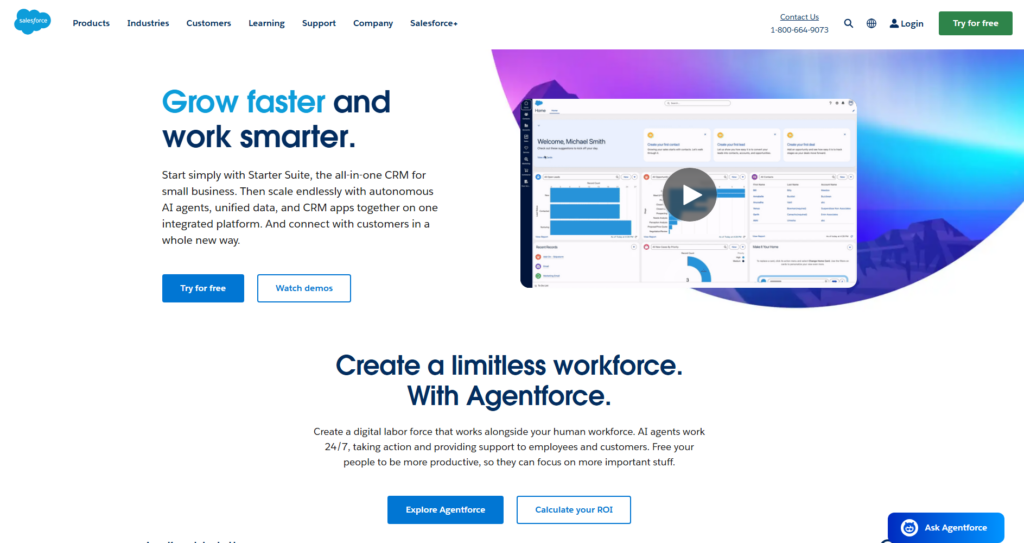
Main Features
- Centralized customer database that consolidates data across all touchpoints
- Sales, marketing, and service automation for increased efficiency
- Advanced analytics and reporting to track customer behavior and business performance
- Seamless integration with leading e-commerce platforms like Shopify, Magento, and WooCommerce
- Customizable workflows tailored to specific business needs
Price
- Pricing varies depending on edition and features
- Essentials plan starts around $25/user/month (pricing may vary by region and features)
Best for
Salesforce’s powerful automation capabilities, combined with its deep integration options, make it an ideal choice for businesses looking to enhance their customer relationships and streamline their operations.
HubSpot
HubSpot offers an intuitive, all-in-one CRM platform designed to help businesses connect with their customers, automate marketing campaigns, and drive sales growth. Its seamless integration with e-commerce platforms makes it a top choice for businesses seeking to engage customers and track their interactions across all stages of the buying journey. HubSpot’s CRM allows you to manage contacts and deals, automate email campaigns, and even integrate with payment gateways to streamline sales processes.
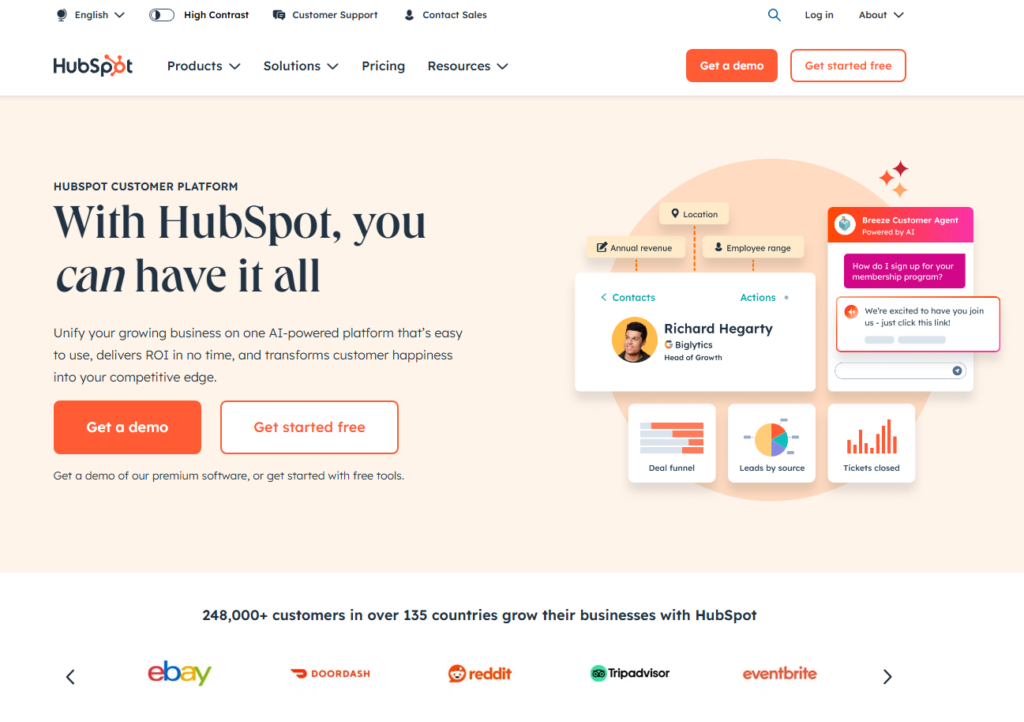
Main Features
- Contact and deal management with personalized customer tracking
- Marketing automation tools for targeted email campaigns and lead nurturing
- Integration with e-commerce platforms and payment gateways for a unified view of customer interactions
- Free CRM with paid add-ons for advanced features (marketing, sales, service hubs)
- Customizable dashboards and reporting tools
Price
- Free CRM available
- Paid plans (Marketing, Sales, Service Hubs) start at $20–$50/month per user (pricing varies by features and scale)
Best for
HubSpot’s user-friendly interface and scalable functionality make it an excellent choice for businesses of all sizes looking to grow and maintain meaningful customer relationships. Whether you’re just starting or expanding, HubSpot’s CRM tools can help you take your e-commerce business to the next level.
CRM Management Tools Comparison
In summary, integrating CRM systems like Salesforce and HubSpot with your e-commerce platform enhances customer relationship management, improves sales conversion, and enables businesses to deliver personalized marketing strategies. By streamlining workflows and automating key processes, these CRM tools help businesses build stronger, long-term customer relationships while driving growth.
| Feature | Salesforce | HubSpot |
|---|---|---|
| Platform Type | Robust, enterprise-grade CRM | Intuitive, all-in-one CRM |
| Ease of Use | Complex, suited for larger businesses with technical expertise | User-friendly, ideal for businesses of all sizes |
| Key Features | – Centralized customer database – Sales, marketing, service automation – Advanced analytics – E-commerce platform integrations – Customizable workflows | – Contact/deal management – Marketing automation – E-commerce/payment integrations – Customizable dashboards – Free CRM option |
| Customization | Highly customizable, tailored for complex needs | Flexible, with scalable add-ons for growing businesses |
| Pricing | – Essentials: ~$25/user/mo (varies by edition) | – Free CRM – Paid plans: $20–$50/mo per user (varies by features) |
| Best For | Large businesses needing advanced automation and scalability | Small to mid-sized businesses seeking simplicity and scalability |
Notes
- Salesforce is ideal for enterprises with complex needs and robust integration requirements.
- HubSpot excels for smaller businesses or those prioritizing ease of use and affordability.
Shipping Integrations
Shipping integrations are a constant for delivering exceptional customer experiences and optimizing order fulfillment. By seamlessly connecting your online store with leading carriers and logistics providers, these integrations automate essential shipping tasks, such as label generation, rate calculations, and delivery scheduling, while enabling faster delivery times and providing real-time tracking updates to customers.
This streamlined, technology-driven approach minimizes manual effort, reduces errors, and ensures transparency throughout the delivery process, fostering trust and reliability. Ultimately, these tools empower e-commerce brands to create a seamless post-purchase experience, strengthen customer loyalty, and lay a robust foundation for long-term growth and success.
ShipStation
ShipStation is a powerful tool for automating and streamlining your e-commerce shipping operations. Its seamless integrations with top ecommerce platforms like Shopify, WooCommerce, and BigCommerce make it easier to manage orders, print labels, and track deliveries all from one centralized dashboard. Whether you’re shipping domestically or internationally, ShipStation helps you stay on top of your shipping tasks, improving efficiency and reducing manual work. It’s an excellent choice for businesses that need to simplify their shipping process while scaling their operations.
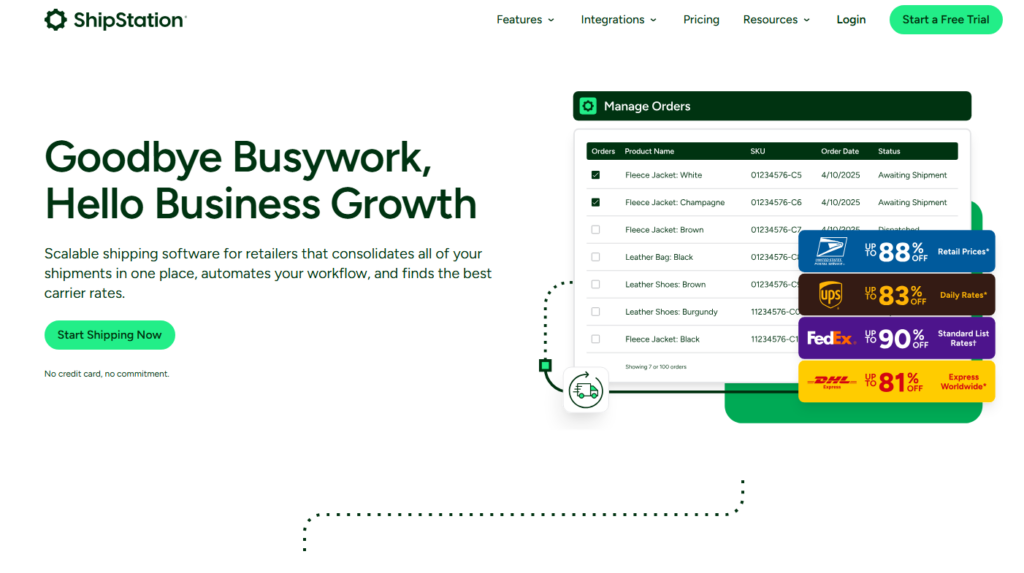
Main Features
- Multi-carrier shipping management for flexibility and cost-effectiveness
- Batch label printing and customizable automation rules to save time
- Branded tracking pages to enhance the customer experience
- Integration with major e-commerce platforms and marketplaces for streamlined operations
Price
- Plans start at $9.99/month (pricing scales based on shipment volume and features)
Best for
ShipStation’s versatility and user-friendly interface make it a great fit for businesses looking to optimize their shipping workflows while maintaining full control over order fulfillment and tracking.
Easyship
Easyship offers a global shipping solution tailored to ecommerce businesses of all sizes. It simplifies international logistics by integrating with over 250 shipping solutions worldwide, allowing businesses to access real-time shipping rates, taxes, and customs documentation all within one platform. With its ability to automate many of the tedious shipping tasks, Easyship makes it easier to scale your business globally while keeping costs in check. Whether you’re shipping locally or internationally, Easyship provides the tools to help businesses stay competitive in the global marketplace.
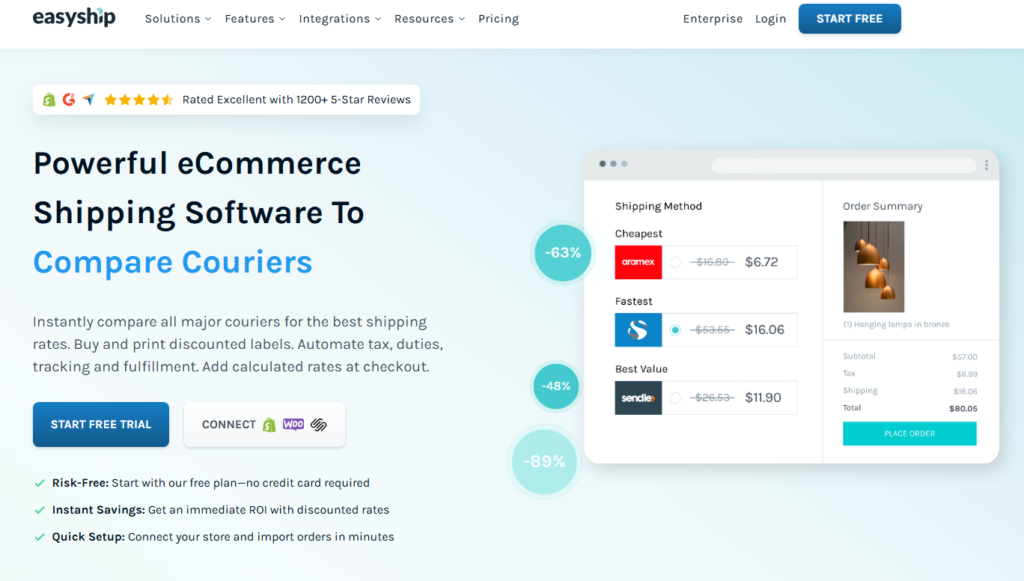
Main Features
- Real-time shipping rates and taxes for accurate pricing
- Integration with over 250 shipping solutions worldwide, including major carriers
- Automated customs documentation for faster international shipments
- Delivery tracking and analytics for full visibility into shipment status
Price
- Free plan available
- Paid plans start at $29/month (pricing varies by shipment volume and features)
Best for
Easyship stands out for its global shipping capabilities and cost-effective solutions, making it a top choice for e-commerce businesses seeking to expand their reach and optimize their shipping processes.
Shipping Integrations Comparison
Integrating shipping solutions like ShipStation and Easyship into your e-commerce platform not only optimizes the order fulfillment process but also enhances the overall customer experience. By automating shipping tasks and ensuring timely deliveries, these tools help businesses reduce operational costs, improve shipping efficiency, and increase customer satisfaction. With real-time tracking and seamless integrations, these shipping solutions help to scale smoothly while maintaining a high level of service.
| Feature | ShipStation | Easyship |
|---|---|---|
| Platform Type | Centralized shipping management tool | Global shipping solution |
| Ease of Use | User-friendly dashboard for streamlined operations | Intuitive platform with global focus |
| Key Features | – Multi-carrier management – Batch label printing – Automation rules – Branded tracking pages – E-commerce integrations | – Real-time rates/taxes – 250+ shipping solutions – Automated customs docs – Delivery tracking/analytics |
| Global Reach | Strong domestic/international support | Extensive global focus with 250+ carriers |
| Pricing | Starts at $9.99/mo (scales with shipment volume) | Free plan; paid plans start at $29/mo (varies by volume) |
| Best For | Businesses needing efficient, scalable domestic/international shipping | Businesses focused on global expansion and cost-effective shipping |
Notes
- ShipStation is ideal for businesses prioritizing automation and a centralized shipping workflow.
- Easyship excels for global e-commerce with extensive carrier options and customs automation.
Benefits of Using Skyvia for E-commerce Integration
Skyvia is an incredibly versatile, cloud-based data integration platform that simplifies the complex task of connecting different services. Whether you’re integrating your e-commerce platform with a CRM, ERP, marketing tools, or payment gateways, Skyvia provides a seamless solution without the need for complex coding or specialized developers. This makes it a perfect choice for businesses of all sizes and technical skill levels, from small startups to large enterprises.
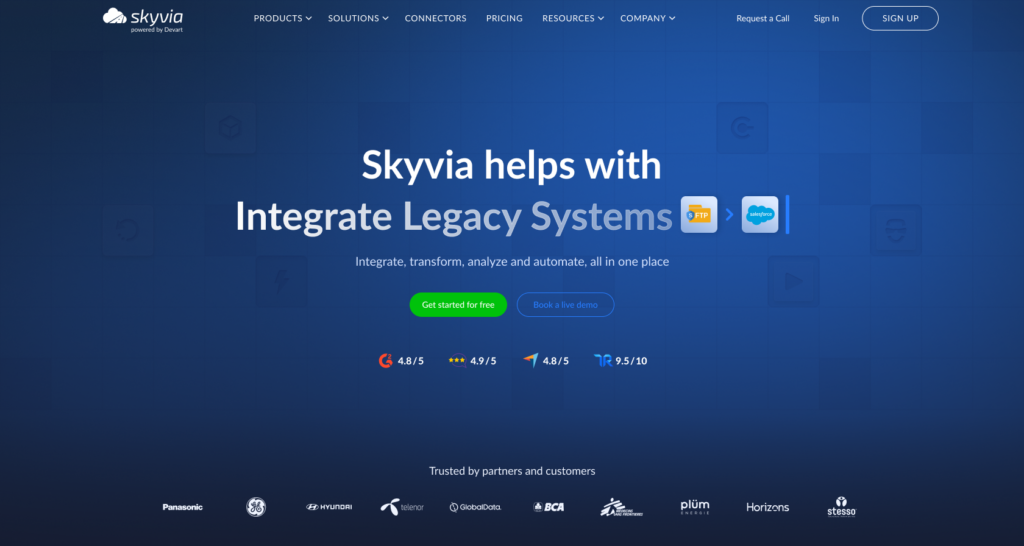
Key Benefits of Skyvia for E-commerce Integration
- No-Code, User-Friendly Integration: With an intuitive drag-and-drop interface, setting up and managing integrations becomes a breeze. There’s no need for programming expertise, allowing your team to focus on what matters most: running and growing the business. This user-friendly setup reduces onboarding time and removes the need for hiring or relying on developers for integrations.
- Comprehensive Connectivity: Skyvia supports a wide array of data sources and destinations (over 200 connectors), including popular e-commerce platforms like Shopify, WooCommerce, and Magento, as well as databases, cloud applications, and file storage services. This ensures smooth data flows across the business ecosystem.
- Real-Time Data Synchronization: The platform offers real-time or scheduled data synchronization, ensuring critical business data such as inventory, customer information, and order statuses are always up to date. This real-time synchronization helps prevent issues like stockouts, overselling, and customer dissatisfaction, especially important during peak periods like Black Friday and Cyber Monday.
- Secure Data Backup and Reliability: Besides streamlining integration, it offers automated, secure backup features, ensuring your valuable data is protected against loss. All data transfers are encrypted, and the platform complies with top-tier industry security standards, guaranteeing data reliability and business continuity.
- Enhanced Operational Efficiency: Skyvia automates routine data management tasks, reducing the time spent on manual updates. This reduces human error and cuts operational costs. By automating these tasks, your team can focus on scaling the business and improving the customer experience.
- Personalized Customer Experience: With Skyvia, your data remains unified and up-to-date, allowing you to craft personalized marketing campaigns, product recommendations, and targeted customer support. This enables more engaging customer interactions, driving higher loyalty and conversion rates.
- Scalability and Flexibility: As your business grows, Skyvia scales with you. The platform is designed to handle large volumes of data seamlessly, offering the flexibility to grow without the need for constant reconfiguration or infrastructure upgrades.
Experience next-level ecommerce integration with Skyvia — seamlessly connect your storefront, CRMs, marketing tools, and databases in just a few clicks. Watch our step-by-step video tutorials to see how easily you can set up and maximize Skyvia’s powerful e-commerce integration capabilities!
Watch Zendesk and Salesforce integration below, or look for more tutorials on the Skyvia YouTube channel.
Conclusion
With integration, businesses gain a 360-degree view of their customers, enabling personalized experiences, smarter marketing, and proactive service. Real-time inventory synchronization prevents overselling and stockouts, while automated data management frees teams to focus on growth instead of troubleshooting disconnected systems.
Solutions like Skyvia stand out by making integration accessible to all skill levels through a no-code, cloud-based platform that connects over 200 data sources and automates even complex workflows, without the need for IT resources or custom development. This empowers businesses to scale confidently, adapt quickly to market changes, and deliver seamless customer experiences across every channel.
If you’re ready to move beyond manual processes and unlock the full potential of your e-commerce data, Skyvia offers a comprehensive, user-friendly solution to help you thrive.
F.A.Q. for E-commerce integration
Why is e-commerce integration important for my business?
Integration eliminates manual data entry, reduces errors, ensures real-time data accuracy, and enables you to deliver a seamless customer experience. It also supports omnichannel selling, helps scale your business, and allows for faster, data-driven decision-making.
What are common types of e-commerce integrations?
Common integrations include connections with:
- Inventory management systems
- Payment gateways
- Shipping and fulfillment solutions
- CRM and ERP platforms
- Email marketing and analytics tools
How does e-commerce integration improve customer experience?
By synchronizing data across systems, integration ensures accurate product availability, order tracking, and personalized marketing, resulting in faster service and higher customer satisfaction.
Can e-commerce integration software scale as my business grows?
Yes, many integration platforms are designed to scale with your business, allowing you to add new sales channels, systems, or features as needed without major disruptions.

